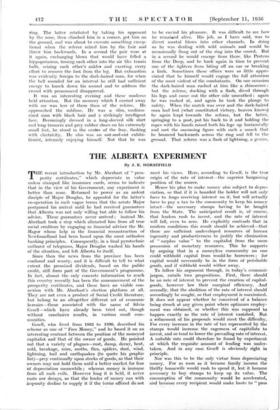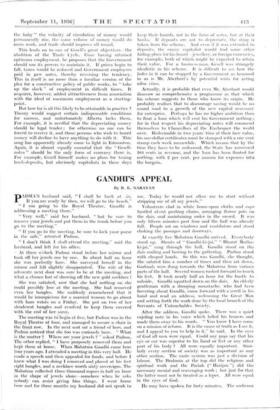THE ALBERTA EXPERIMENT
By J. K. HORSEFIELD
THE recent introduction by Mr. Aberhart of " pros- perity certificates," which depreciate in value unless stamped like insurance cards, seems to indicate that in the view of his Government, any experiment is better than none. Returned to power as an ardent disciple of Major Douglas, he appealed for the latter's co-operation in such vague terms that the astute Major postponed his- arrival until he had received guarantees 'that Alberta was not only willing but able to follow his advice. These guarantees never arrived ; instead Mr. -Aberhart took a step which alienated him from all true 'social creditors by engaging as financial adviser the Mr. Magor whose help in the financial reconstruction of Newfoundland had been based upon the most orthodox banking principles.. Consequently, in a final pyrotechnic outburst of telegrams, Major Douglas washed his hands of the situation, and left Alberta to itself.
Since then the news from the province has been confused and scanty, and it is difficult to 'tell to what extent the promised dividends, based on the public credit, still form part of the Government's programme. In fact, almost the only concrete information to reach this country recently has been the announcement of the prosperity certificates, and these have no visible con- nexion with Mr. Aberhart's election platform at all. They are not even a product of Social Credit literature, but belong to an altogether different set of economic heresies—those associated with the name of Silvio Gesell—which have already been tried out, though without conclusive results, in various small com- munities.
Gesell, who lived from 1862 to 1930, described his scheme as one of " Free Money," and he based it on an interesting contrast between the position of the moneyed capitalist and':that of the owner of goods. He pointed out that a variety of plagues—rust, damp, decay, heat, cold, breakage, mice, moths, flies, spiders, dust, 'wind, lightning, hail and earthquakes (to quote his graphic list)—prey continually upon stocks of goods, so that their owners may not hold them until a better market for fear Of depreciation meanwhile ; whereas money is immune from all such evils. However long it is held,: it never rusts nor decays, so that the lender of money can with impunity decline to supply it if the terms offered do not meet his views. Here, according to Gesell, is the true origin of the rate of interest—the superior bargaining position of the usurer.
Hence his plan to make money also subject to depre- ciation, so that if it is hoarded the holder will not only have to forgo receiving interest on it, but will actually have to pay a tax to the community to keep his money intact—the necessary stamps having to be bought from the State. The anticipated result is, of course, that -lenders rush to invest, and the rate of interest will fall, even to zero. He explicitly contends that in modern conditions this result should be achieved—that there are sufficient undeveloped resources of human ingenuity and productiveness to justify the elimination of " surplus value " to. the capitalist from the mere possession of monetary resources. This he supports by arguing that in a moneyless community no one could withhold capital from would-be borrowers ; for capital would necessarily he in the form of perishable goods, and if withheld would wither away.
To follow his argument through, in today's economic jargon, entails two propositions. First, there should be no rate of interest to prevent the creation of capital- goods, however low their marginal efficiency. And secondly, that the abolition of the rate of interest should accordingly be sought, so that employment is maximised. It does not appear whether he conceived of a balance being struck at any given point where optimum employ- ment was obtained, or whether this was supposed to happen exactly as the rate of interest vanished. But a refinement of his proposals. would meet the difficulty; For every increase in the rate of tax represented by the stamps would increase the eagerness of capitalists to invest, and so tend to lower the prevailing rate of interest., A suitable rate could therefore be found by experiment at which the requisite amount of lending was under- taken. And in any case Gesell is obviously right in principle.
Nor was this to be the only virtue from depreciating money. For as soon as it became family income the thrifty housewife would rush to spend it, lest it became necessary to buy stamps to keep up its. value, The consumptiOn of the community would be accelerated, and because every recipient would make haste to " pass the baby " the velocity of circulation of Money would permanently rise, the same volume of money would do more work, and trade should *improve all round.
• This leads on to one of Gesell's great objectives—the abolition of the Trade Cycle. Once having attained optimum employment, he proposes that the Government should use its powers to maintain it. If prices begin to fall, taxes would be reduced and Government employees paid in new. notes, thereby reversing the tendency. This in itself is no more than a familiar version of the plea for a constructive policy of public works, to " take up the slack " of employment in difficult times. It acquires, however, added attractiveness from association with the ideal of maximum employment as a starting- point.
But how far is all this likely to be attainable in practice ? Theory would suggest certain indispensable conditions for success, and unfortunately Alberta lacks . them. For example, it is needful that the depreciating money should be legal tender ; for otherwise no one can be forced to receive it, and those persons who wish to hoard money will decline .to have anything to do with it. This snag has apparently already come to light in Edmonton. Again, it is almost equally essential that the " Gesell- notes " should be the only form of currency there is. For example, Gesell himself makes no plans for taxing bank-deposits, but obviously capitalists in these days keep their hoards, not in the form of notes, but at their banks. If deposits are not to depreciate, the sting is taken from the scheme. And even if it was extended to deposits, the canny capitalist would find some other hiding-place for his hoard-Hewellery, or foreign currencies, for example, both of which might be expected to retain their value. For a business-man. Gesell was strangely idealistic in his scheme. It is difficult to see how the holes in it can be stopped by a Government. as hemmed in as is Mr. Aberhart's by potential writs for acting ultra wires.
Actually, it is probable that even Mr. Aberhart would disavow so comprehensive a programme as that which his scheme suggests to those who know its origin. He probably. realises that to discourage saving would be no sound road to a growth of the new capital necessary for enterprise. Perhaps he has no higher. ambition than to float a loan which will cost his Government nothing ; for in that respect his depreciating notes will commend themselves to Chancellors of the Exchequer the world over. Redeemable in two years' time at their face value, his one-dollar certificates must be.statuped with a one cent stamp each week meanwhile. Which means that by the time they have to be redeemed, the State has recovered 104 cents in revenue, and the loan has been floated for nothing, with 2 per cent. per annum for expenses into the bargain.













































 Previous page
Previous page